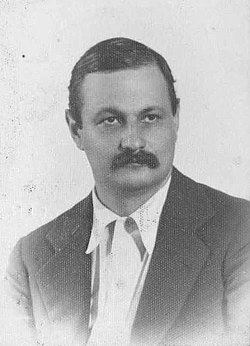Sándor Lénárd died fifty years ago
Sándor Lénárd (9 March 1910 - 13 April 1972) was one of the most extraordinary personalities of 20th- century Hungarian cultural history, who is important to commemorate the 50th anniversary of his death, also in order to raise awareness of his oeuvre. (...) but especially because it helps to answer a question that is especially important for Hungarians living in the Hungarian diaspora, separated from their homeland: is it possible to create a oeuvre that enriches the nation and the Hungarian values, detached from the linguistic and social community of Hungary, far away in a foreign land?
The fate of Lénárd shows that it is possible, albeit under difficult circumstances and at the cost of many struggles, as it is also possible to gain respect for the Hungarian nation in a foreign community that knows almost nothing of it.
It is even more peculiar that Sándor Lénárd's sense of Hungarian identity was certainly strengthened abroad, in his adult years. Born into a German-Hungarian bilingual family, his father came to Hungary at a young age, and although he managed to find a real home here, he was forced to leave Hungary - we don't know exactly why, but it must have been in connection with the Trianon tragedy. It is not entirely known where the family lived in 1918-20, but it is certain that in 1919 the head of the family was working in Fiume. From 1920 onwards, they lived in Vienna, where Sándor Lénárd grew up, and until the Second World War it seemed that he would live his life as an Austrian (although he did visit Hungary several times). Moreover, he was not a particularly notable personality: he was a typical intellectual of the inter-war period, who could not excel in anything. Although he graduated from the University of Medicine, for unknown reasons he did not obtain a diploma. Although he also demonstrated excellent abilities in literature, music and classical philology, he did not stand out as a writer, musician or classical philologist. He did not, however, lose his native Hungarian, something which undoubtedly reflects his natural talent (he later reportedly spoke thirteen languages, at least four of them at native level), and remained a Hungarian citizen for the rest of his life.

After the Anschluss, he fled from Vienna to Rome, Italy, where he lived for 14 years - essentially illegally as he had only a three-month entry visa and his Hungarian documents had long expired. In addition to his extraordinary resourcefulness, it was the help of Hungarians living in Rome that enabled him to survive and to re-establish intensive contact with Hungarian culture - he also made friends and acquaintances with the eminent Hungarian intellectuals in Rome, and from then on, wherever he went, he was among the intellectual authorities of the Hungarian diaspora. As a writer, however, he still wrote in German and Italian.
It is hardly surprising that after 1945 he did not wish to return to Hungary or Vienna, but it is all the more surprising that in 1952 he moved to Brazil with his family and remained there for the rest of his life. There he moved to increasingly remote and small settlements, a fact no doubt due his inherent tendency to solitude and his reclusive nature, and the constant need to hide that he was used to in Italy.
He began to write Hungarian literature in Brazil, but his works were published in Hungary only in the last five years of his life; his best-known works are semi-autobiographical narratives and quasi essays on cultural history. This peculiar genre, which became popular, was not only of literary value, but could also convey to readers cultures unknown and often unknowable. His main work, The Valley of the Latin Bear (Budapest, 1967), is a poetic document of the fate of our compatriots who were torn from the community of the mother tongue and the Hungarian homeland. He did not become world-famous as a Hungarian writer, of course, but as a kind of classical philologist, working in a very special field that initially seemed to everyone to be a crazy hobby: translating modern world literature into Latin. His greatest success was the translation of Winnie the Pooh, which was first published in 1956 by a Hungarian publisher in Brazil, Dezső Landy, in 110 copies. The work gained publicity almost two years later, and then major American publishers were able to distribute hundreds of thousands of copies. The Hungarian publisher ‘obviously’ made no profit from the book, but the name of the eccentric Hungarian writer became known throughout the world. In fact, to this day, he earned the Hungarian nation high esteem among those who are still learning Latin all over the world.